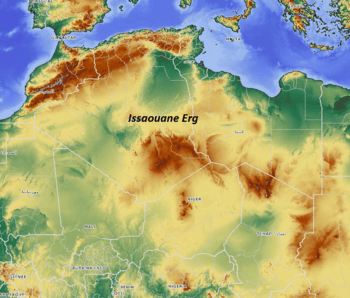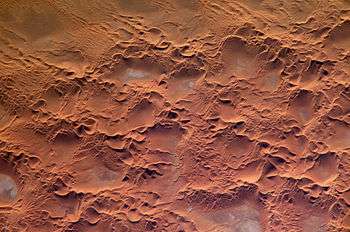Issaouane Erg
| Issaouane Erg Issaouane-N-Irrararene | |
|---|---|
| Erg | |
|
Image: NASA, 2005 | |
 | |
| Coordinates: 31°10′N 7°58′E / 31.167°N 7.967°E | |
| Country | Algeria |
| Area | |
| • Total | 15,000 sq mi (38,000 km2) |
| Time zone | CET (UTC+1) |
The Issaouane Erg (also called Issaouane-N-Irrararene[1]) is an approximately 38,000 km2 erg (sand sea) in Algeria's portion of the Sahara desert, located at 27°50′N 7°14′E / 27.83°N 7.23°E.
Topography
The Issaouane Erg is located near the Ahaggar Mountains. It is part of a major dune field that extends from Issaouane Erg in the north to the Sudanese Erg in the south, flanked by the Libyan erg of Murzuq.[2] In the north, the Issaouane Erg ends at the Tinrhert Plateau and in the south at the Fadnoun Plateau.[3] To a large extent it follows the 500-m contour of the surrounding landscape, ergs mostly being confined to basins.[4][5]
Sand in the Issaouane Erg, below the level of the sand dunes, has accumulated to a depth of 20 to 30 meters.[6] It has barchan dunes as well as star dunes[3] of 300 to 430 meters high.[7] The presence of both barchan dunes (which form due to unidirectional winds) and star dunes (which form when winds from various directions deposit sand) "suggests that wind regimes have changed over time".[8] NASA's Earth Observatory notes all three types of erg dunes are present in the photos of the Issaouane Erg taken from the International Space Station: stationary mega dunes, which can take hundreds of thousands of years to form; mesoscale dunes (including the stardunes), which form on the mega dunes; and yet smaller ones which migrate over the bigger ones.[9] In the NASA images, the light-blue spots in the valleys between the dunes (which are red from iron oxide) are sabkhah, or salt flats, left after the evaporation of accumulated water.[10]
Cultural history
Neolithic artifacts, sculptures and paintings have been found in the Issouane Erg.[11] from the Kiffian culture.
Natural resources
The Issaouane Erg contains oil; the Tifernine oilfield is explored by the Algerian state oil company Sonatrach, which began developing the oilfield with foreign assistance,[12] including from Korea[13] and Spain (Repsol signed an agreement to invest and explore in 1990). The oilfield has been in production since late 1998.[14]
See also
References
- ↑ Dubief, Jean (1999). L'Ajjer, Sahara central. Karthala. p. 220. ISBN 9782865378968.
- ↑ Walton, Kennet (2007). The Arid Zones. Transaction Publishers. p. 67. ISBN 978-0-202-30928-6.
- 1 2 "Issaouane Erg, Algeria". Earth Observatory. NASA. Retrieved 2010-01-03.
- ↑ Evans, David (2013). Andrew S. Goudie, ed. Arid Land Geomorphology. Geomorphology: Critical Concepts in Geology. 4. Routledge. p. 22. ISBN 9781136801501.
- ↑ Kenneth Pye, ed. (2008). "The Formation of Sand Seas and Dune Field". Aeolian Sand and Sand Dunes. Haim Tsoar. p. 158. ISBN 9783540859109.
- ↑ Lancaster, Nicholas (2002). Geomorphology of desert dunes. Routledge. p. 202. ISBN 978-0-415-06094-3.
- ↑ Lancaster, Geomorphology, 73.
- ↑ Bond, Peter (2012). Exploring the Solar System. John Wiley & Sons. p. 78. ISBN 9781444351088.
- ↑ "Dune types in the Issaouane Erg, Eastern Algeria". Earth Observatory. NASA. Retrieved 9 October 2015.
- ↑ McKinnon, Mika (7 June 2015). "The Shifting Sands Of The Sahara Are A Lesson In Dune Dynamics". Io9. Retrieved 10 October 2015.
- ↑ Camps, Gabriel (1974). Les civilisations préhistoriques de l'Afrique du Nord et du Sahara. Doin. p. 306. ISBN 978-2-7040-0030-2.
- ↑ "Algeria: Oil processing plant inaugurated in Sahara". 1999-10-15. Retrieved 2010-01-03.
- ↑ "Remarks by President Roh Moo-hyun of the Republic of Korea at the Korea-Algeria Business Forum". Dynamic Korea. 2006-03-12. Retrieved 2010-01-03.
- ↑ "Algeria - Oilfield Profiles - Repsol/YPF - Tifernine/Tin Mesnaguene". APS Review Gas Market Trends. 2001-02-05. Retrieved 2010-01-03.
